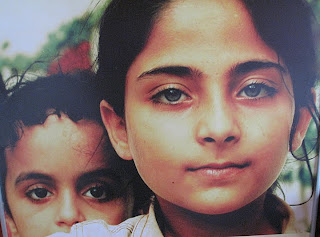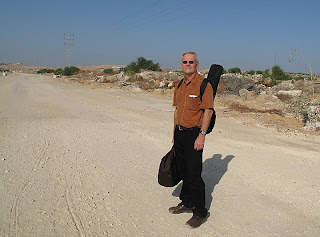


“Did you feel safe?”
This is the first question I get asked as I finally touch down on US soil, after a grueling 21 hours of travel getting from my bed in Iraq to one in Washington D.C. I say grueling, but this same distance would have been traveled by my grandmother over land and sea in about 6 months. She would no doubt have gotten sea sick several times along the way, and paid dearly for food the Jordanian Airlines stewardess slipped under my comatose head. (Her trip from Kansas to Walla Walla in a covered wagon was tough enough for her, so I doubt she had aspirations of a trip to Iraq. But still, you get the point).
In the airport, I picked up the Washington Post (yes, they still print the thing, its not just on-line, Dan!), and find out that 14 people recently died in a car bomb attack in one of the small Iraqi cities in which we work. Another car bomb killed 30 people weeks before in Baghdad. But this is not my experience there.
My experience is going to a local park in Iraq where a large group of high school students we work with are highlighting International Peace Day. Thousands are in this park, strolling with their babies, and laughing at the riddles posed by the students who hand out candy prizes for the right answers, and tell us about the world-wide movement to promote peace.
My experience is walking around the corner after dark in search of a little dinner, and finding an elderly Iraqi fruit vendor. His shop is no larger than my bedroom, with fruit boxes cascading outside on the street. My colleague and I buy enough for dinner, and because I speak no Arabic and he speaks no English, we hand-signal the fruit we want. After we weigh out what we want, he slowly keeps adding pieces of fruit, a pomegranate here, a bag of dates here into the plastic sack, then hands it to me. When I give him $7, he quietly but insistently refuses. It’s his gift to me. Natalie tells me it is his way of welcoming me to his country.
And I would bet serious money that there are more guns in the households surrounding my hotel here in Washington DC than in any neighborhood in Iraq I walked through. Feeling safe, and being safe. Who knows where the truth lies.
The second question I was asked as I rode in the Super Shuttle to my hotel here was, “Did you feel hopeful by what you saw in the Middle East?”
I met with students in Iraq and Gaza working to promote female rights, Lebanese students in Hezbollah neighborhoods cleaning up parks and soon will be working on creating more open meetings of governing bodies. I met students working on access to clean water issues. At the same time, I met with students taken in by the police for questioning because they were planting trees and taking photos to share on-line, but it was a group of both male and female students and the fundamentalists don’t like that too much.
Yesterday, I had the honor to meet with Landrum Bolling, author of “Search for Peace in the Middle East”, a war correspondent for many years, and long-time Mercy Corps advisor. He sadly told me that for the first time he feels pessimistic about prospects for peace in the Middle East. Yet in the next breath, said this work with young people, connecting them in cooperative actions across borders is absolutely necessary and is what can help make a difference.
The young people I met with throughout the Middle East face such tough odds. Some are imprisoned by a wall surrounding their land from which they cannot get out, living in cities where car bombs can explode without warning, or living under governments where a meeting open to the public is as rare as a banjo. Thomas Friedman once said "Pessimists are usually right and optimists are usually wrong but all the great changes have been accomplished by optimists.” He must have run into some of these folks.



